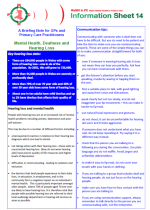How To Open Up Health Services For Deaf People

Action on Hearing Loss has discovered a significant percentage of these kinds of people face significant problems when trying to use mental health services.
There are 534,000 people in Wales with some form of hearing loss and they are at an increased risk of mental health problems including anxiety, depression and poor self-esteem.
By 2031 the number of people with hearing problems is set to grow to 725,000 so it is a subject which GPs and primacy care practitioners across the country really need to understand.
As a result it is up to mental health workers to help make these services more accessible to this group and this can be achieved through a series of simple processes such as:
-
Asking patients for details about their preferred method of communication when they first join a new GP or healthcare service
-
Introducing a ‘flagging’ system on patients’ computer records to allow healthcare workers to understand any specific needs the patient may have when they visit a service and passing on this information for onward referrals
- Introducing procedures to ensure the individual communication support needs of patients are met - including booking a suitable communication professional such as a Sign Language Interpreter or Lipspeaker
These are just some of the way mental health services can be made more accessible to people with hearing loss and you can find out more by reading our latest Information Sheet 14.
Alternatively, we'll be going into more details about how you can improve your communications with deaf people with some more blog posts later this week.
If you have any questions about Information Sheet 14 or any other queries please contact our Project Manager Lesley Hills via email at lhills@rcgp.org.uk or on 029 2050 4516.


